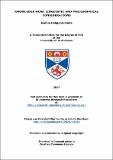Files in this item
Knowledge-how : linguistic and philosophical considerations
Item metadata
| dc.contributor.advisor | Hawley, Katherine (Katherine Jane) | |
| dc.contributor.author | Habgood-Coote, Joshua | |
| dc.coverage.spatial | [10], 232 p. | en_US |
| dc.date.accessioned | 2017-08-30T11:45:26Z | |
| dc.date.available | 2017-08-30T11:45:26Z | |
| dc.date.issued | 2017-12-08 | |
| dc.identifier | uk.bl.ethos.722985 | |
| dc.identifier.uri | https://hdl.handle.net/10023/11566 | |
| dc.description.abstract | This thesis concerns the nature of knowledge-how, in particular the question of how we ought to combine philosophical and linguistic considerations to understand what it is to know how to do something. Part 1 concerns the significance of linguistic evidence. In chapter 1, I consider the range of linguistic arguments that have been used in favour of the Intellectualist claim that knowledge-how is a species of propositional knowledge. Chapter 2 considers the idea that sentences of the form ‘S knows how to V’ involve a free relative complement, and the relation between this claim and the Objectualist claim that knowledge-how is a kind of objectual knowledge. Chapter 3 argues that Intellectualism about knowledge-how faces a problem of generality in accounting for the kinds of propositions that are known in knowledge-how, which is analogous to the generality problem for Reliabilism. Part 2 turns to philosophical considerations, offering an extended inquiry into the point of thinking and talking about knowledge-how. Chapter 4 considers why we should want to work with a concept of knowledge, isolating two hypotheses: i) that thinking and talking about knowledge-how helps us to pool skills, and ii) that thinking and talking about knowledge-how helps us to engage in responsible practices of co-operation. Chapter 5 criticises the former hypothesis by arguing against the suggestion that there is a knowledge-how norm on teaching. Chapter 6 offers an indirect argument for the latter hypothesis, arguing for a knowledge-how norm on intending. Part 3, which consists of chapter 7, offers a positive account of knowledge-how which takes into account both philosophical and linguistic considerations. According to what I will call the Interrogative Capacity view, knowing how to do something consists in a certain kind of ability to answer the question of how to do it. | en_US |
| dc.language.iso | en | en_US |
| dc.publisher | University of St Andrews | |
| dc.rights | Attribution-NonCommercial-NoDerivatives 4.0 International | * |
| dc.rights.uri | http://creativecommons.org/licenses/by-nc-nd/4.0/ | * |
| dc.subject | Epistemology | en_US |
| dc.subject | Philosophy of language | en_US |
| dc.subject | Philosophical methodology | en_US |
| dc.subject | Philosophy of linguistics | en_US |
| dc.subject.lcsh | Knowledge, Theory of | en |
| dc.subject.lcsh | Language and languages--Philosophy | en |
| dc.subject.lcsh | Linguistics--Philosophy | en |
| dc.subject.lcsh | Methodology | en |
| dc.title | Knowledge-how : linguistic and philosophical considerations | en_US |
| dc.type | Thesis | en_US |
| dc.contributor.sponsor | Arts and Humanities Research Council (AHRC) | en_US |
| dc.type.qualificationlevel | Doctoral | en_US |
| dc.type.qualificationname | PhD Doctor of Philosophy | en_US |
| dc.publisher.institution | The University of St Andrews | en_US |
| dc.publisher.department | The University of Stirling | en_US |
The following licence files are associated with this item:
This item appears in the following Collection(s)
Except where otherwise noted within the work, this item's licence for re-use is described as Attribution-NonCommercial-NoDerivatives 4.0 International
Items in the St Andrews Research Repository are protected by copyright, with all rights reserved, unless otherwise indicated.


